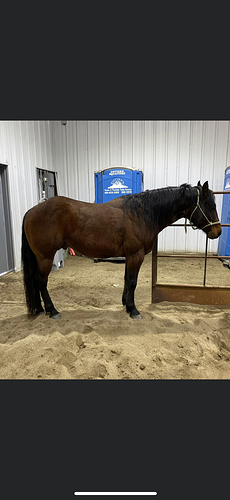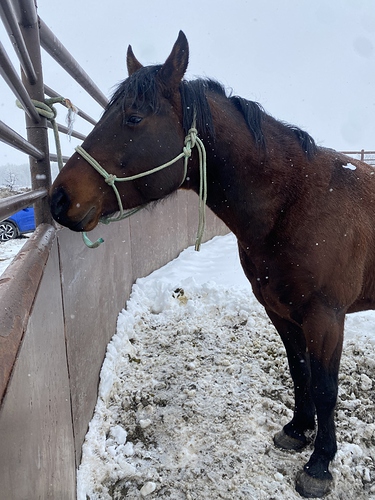We gelded an 8yr old herd stallion, without any problems. Horse had been trained and used as a ranch horse before being turned out with his mares. Owner firmly believed that a horse had to have brains to handle training, learn to work at ages 3-4-5yrs, BEFORE being allowed the privilege of reproducing himself. Then horse had to manage his small (5 to 7) herd of mares by keeping them in good flesh, pregnant again, foals (not his babies) on the ground also in good condition. Older mares taught him “No means NO!!” He politely would ask “Anyone ready to breed?” Not just jump them. Then his foals were evaluated the next spring to see if they were of a quality good enough to breed more.
At any point in developing him, even after breeding him, the owner could decide to geld him.
The stallion we bought was pretty easy to handle, well socialized with herd life. We had no mares to breed, so he got cut once we got home. We took him to the Vet Clinic, they have the supplies, Dr on hand should things go bad. Older horse has bigger blood vessels, needs special attention during and after the procedure. Do get him moving a few hours after gelding and several times a day after. He will probably take longer to heal and close, simply because the incision will be larger than a younger horse. So a few blood drops even a couple months after, is not an impossibility or an emergency. Check with the Vet if it worries you. Has happened to us with 2 big horses. Our old, very wise Vet was reassuring, “Big, older horse means bigger incision, which equals longer healing time.” They did close up fine.
The stallion was a dominant horse but not obnoxious about it. Easy to live with, but noticed almost everything. That could have been his Great Plains home, used to seeing miles before moving to Michigan with our trees that shortened the views. He actually lost top spot after gelding, another dominent gelding moved up. Not a big fight, ex-stallion just got shoved over. He got more settled as time went along, stayed easy.
We sold him to be used as a Pony Horse at the track. Buyer loved him!! Called back about how well he did his job, out walking the young horses who had to hurry to keep up, no time to get in trouble! No young colts ever tried knocking horse around. He would exude confidence, “give them the LOOK, and they behaved!” Buyer said the best part was he was never sore, no matter how many hours a day he rode the horse! Some days he was in the saddle all day, could climb off and just walk away, not sore.
I don’t think OP will have much trouble with their late gelding. Horse just needs good training, consistent handling. He will probably be bolder, more confident than other geldings, but losing his testerone may change some of that. He is not old enough for it to have been ingrained like our stallion was. Sounds VERY good with his behaving when tied a while, nice acting around other horses. Being out with mares should have instilled gentlemanly behavior, good social, herd manners. You don’t jump the girls just because she is near you! THAT can get your head kicked in!!
I WOULD be careful for a LONG time keeping him apart, in dealing with only one fence between him and other horses. Striking at new horses while nose sniffing, may put someone’s leg into the fencing, get hurt. We have all double row fencing, one of wire, one inside that of hot tape so no one can touch others in the next field or paddock. Pick his future buddies, stall them on both sides so they can learn each other safely. He is used to being with other horses, not isolated like some people keep stallions. Then it will be less exciting when you let them out together. Three might be better than just two, the odd horse will keep butting in, not just two horses facing off. Best of luck with the new horse!



